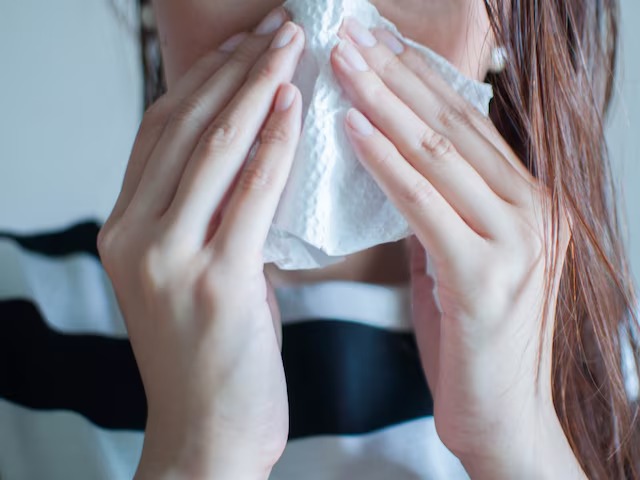Too Much Sneezing, Coughing, and Runny Nose? When to Look for Xolair, the World’s First Anti-Allergy Drug
These days, do you cough, sneeze, or have a runny nose too frequently?
Patients seeking treatment for seasonal allergies in hospital outpatient departments (OPDs) and community clinics have increased noticeably amid frequent weather changes.

Sneezing, itchy nose or throat, nasal congestion, runny nose, watery and itchy red eyes, coughing, wheezing, and shortness of breath are the most common symptoms. Additionally, doctors noted that a number of newly reported instances coincide with allergies and the flu.
According to Dr. Rajeev Gupta, head of internal medicine at the CK Birla Hospital in Delhi, “allergies are quite common these days, and I have been seeing 20–25 percent of my OPD patients presenting allergy-related issues.” This information was provided to News18.
Every week, Dr. Ravi Shekhar Jha, the chief of the pulmonology department at Fortis Escorts Hospital in Faridabad, sees close to seven new patients with respiratory allergies.
When necessary, he has started suggesting skin prick tests to his patients rather than blood testing. “This is very accurate and helps identify common allergens; sometimes, the effects of these allergens on the human body can be mitigated with immunotherapy.”
Likewise, allergies among Indians is a “growing concern,” according to Dr. Anirvan Karmakar of Narayana Hospital in Howrah, West Bengal.
“Every day, a significant number of patients are diagnosed with seasonal or general allergies, especially during peak allergy seasons such as March-April,” Karmakar stated. “People are vulnerable to several allergies during the onset of the summer season, which often include pollen allergies, commonly from trees, grasses, and weeds.” Every day, we treat one or two patients.
Physicians advise patients to take preventative steps, including wearing masks outside, remaining indoors during periods of high pollen count, utilizing air purifiers, and using over-the-counter antihistamines or nasal steroids to treat symptoms.
Why do seasonal allergies occur?
According to specialists, seasonal allergies may appear at any age and without a prior history of allergies.
Seasonal allergies, also called “hay fever” or seasonal allergic rhinitis, are allergies that are frequently seen in the present weather. These symptoms usually appear at certain times of the year when pollen is released into the air by grasses, trees, and weeds.
Pollen from trees such as oak and neem is prevalent in March and may cause allergy responses. Additionally, during this period, respiratory allergies may be exacerbated by pollution and dust.
“These allergens cause the release of histamines into the bloodstream of sensitive individuals, resulting in allergy symptoms,” Dr. Tushar Tayal, head consultant in the Department of Internal Medicine at CK Birla Hospital in Gurugram, said.
It’s critical to lessen environmental triggers for respiratory allergies by using air purifiers, closing doors, and limiting exposure to irritants like incense and burning wood.
Although drugs like steroids and antihistamines might be helpful, it’s important to take them under a doctor’s supervision. Additionally, DIY solutions involve keeping hydrated and donning masks outside.
WHICH ALLERGENS ARE LETHAL?
Some allergic responses may be fatal, although the majority only cause minor discomfort like rashes, itching, or sneezing. Anaphylaxis is a potentially fatal allergic reaction that may result from sensitivities to certain foods, such as shellfish, prawns, peanuts, and eggs, or drugs, like antibiotics and analgesics.
According to Dr. Neeraj Gupta, an allergist consultant in the pediatrics department of Sir Ganga Ram Hospital in Delhi, “anaphylaxis is a serious medical emergency characterised by symptoms such as an itchy rash, throat swelling, shortness of breath, vomiting, light-headedness, loss of consciousness, low blood pressure, and shock.”
“In order to restore normal blood flow, treatment typically entails administering an adrenaline injection, administering intravenous fluids, and positioning the patient in a reclined position with elevated feet.”
Anaphylaxis may also result from responses to blood components during blood transfusions, as well as from the use of muscle relaxants and anesthetics during surgery.
US FDA’S FIRST ALLERGY DRUG USEFUL?
Numerous specialists cited above informed News18 that they were contacted by patients who wanted a prescription for the first medication in history to be authorized by regulatory bodies to lessen allergic responses to a variety of foods after unintentional exposure.
On February 16, the US FDA authorized Xolair, a brand name for the chemical salt omalizumab, to lower the risk of anaphylaxis, which may happen when a person unintentionally comes into contact with one or more meals. The medication was first licensed in 2003 to treat some individuals’ moderate-to-severe persistent allergic asthma.
The medication works by focusing on and preventing immunoglobulin E (IgE), a particular kind of antibody that is essential for allergic responses. Omalizumab helps avoid fatal adverse effects that might cause the patient’s death by lowering IgE levels.
The drug works especially well for treating various food allergies, moderate to severe types of eczema marked by itchy, irritated skin, allergic rhinitis, hay fever, and severe sinusitis.
“Overall, omalizumab provides a targeted approach to managing various allergic conditions, improving the quality of life for patients experiencing moderate to severe symptoms,” CK Birla Hospital’s Gupta stated. “Omalizumab may offer relief to some individuals struggling with multiple food allergies, but an omalizumab trial is necessary to assess the individual’s response.”
Nonetheless, the medication is injectable and might be recommended in cases where the patient’s elevated blood IgE levels indicate that their allergy issues are solely attributable to IgE.
Its purpose is to lessen the likelihood of allergic responses, such as anaphylaxis, in certain people and children who are one year of age or older.
However, since preventative medication is so expensive in India—roughly Rs 32,590—experts predict that the majority of people will continue to be unable to afford it.
This is something we can only recommend to those who can afford it. According to Karmakar from Narayana Hospital, “Xolair can have side effects. Patients who are prescribed Xolair should continue to avoid foods they are allergic to and take the medication frequently every few weeks.”







